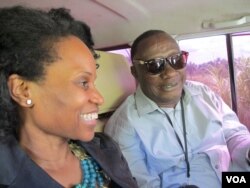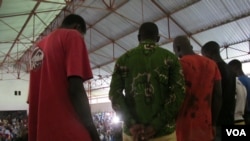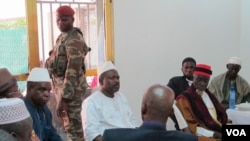Fear about Ebola can be as lethal as the virus itself.
In mid-September, eight people on an Ebola-awareness team – including health workers, local officials and journalists – were killed, their machete-scarred bodies found in a septic tank in a southeast Guinean village.
Days later, in the Guinean town of Forecariah, relatives of an Ebola victim attacked and injured at least two Red Cross workers they believed were mishandling the woman's corpse.
It’s Paulyne Ngalame Ntuba’s job, as a communications and community engagement specialist for the U.S. Centers for Disease Control and Prevention (CDC), to clear up misunderstandings that breed such fear.
The Cameroon native, 39, usually focuses on HIV/AIDS prevention back at the agency’s headquarters in Atlanta, Georgia. But she went to a brown-bag lunch for employees of African descent and heard an appeal to help her Ebola-stricken home region.
"I responded before I became scared," she said. Weeks later, she landed in Guinea for a 30-day detail.
Fact-finding mission
One recent morning, she was part of a motorcade of SUVs lurching along a cratered, two-lane road, headed 100 kilometers east from this capital city past cement factories, scattered villages, rice fields and pineapple plantations.
Ngalame Ntuba was headed to Forecariah, hometown of Guinea Prime Minister Mohamed Said Fofana, who rode in one of the lead vehicles. He had called a town meeting to find out more about the attack and to urge cooperation to halt Ebola's spread.
"He's taking the time to go off and explain to his own people" that the virus requires a change in customs and attitudes, said Ngalame Ntuba, who was asked to represent the CDC in a show of solidarity with Guinea’s Health Ministry. A disease detective, she’s also trying to find the source of community resistance.
In Forecariah, hundreds crowded into a school auditorium, some using handouts on Ebola to fan themselves in the stifling heat. A single oscillating fan cooled the prime minister as he aimed to convince them that the Ebola virus is real, potentially lethal and yet containable – if they alter practices including burial traditions. Murmurs and grumbles arose from the audience.
Perhaps aiming to bring down the temperature, Fofana called up six young men who'd been jailed after the attack. Four are sons of the dead woman, an aide said. They stood on the stage, apologized for their actions, and the prime minister ordered their release.
The crowd cheered as the men stepped down. The prime minister invited a senior imam to speak, and he pledged his support and leadership. Religious leaders have encourage their Islamic followers to heed health regulations from the government.
Fofana asked the crowd if he could tell Guinea's president to count on Forecariah's youth to help stop the virus. From the back of the hall, young men waved and shouted their assent. The prime minister announced new funding for programs supporting youths, women and elderly, then departed on a crest of applause.
Counting on support
Later, at a luncheon in a nearby village, the prime minister acknowledged what he called important financial aid and other support from the United States and other Western partners. But "little that has been promised has arrived," he complained to the CDC’s Ngalame Ntuba and a journalist.
Before excusing himself to talk with local and religious leaders at another table, he added: "Those who really want to help should come and see the need."
Return to the scene
Six days later, Ngalame Ntuba returned to Forecariah with other health experts from Guinea’s government, the CDC, the World Health Organization and more.
Her goal was to test a more participatory, conversational approach about Ebola communication with a focus group of teachers, students, health care workers, business owners and a Red Cross volunteer. She sought their help in refining messages about Ebola prevention and treatment.
"Suspicion is very real," she said. Locals believe that "foreigners" – a term applied even to Guineans from outside the region – may be deliberately spreading the disease. So when Ngalame Ntuba offered chocolates at the meeting’s start, participants accepted only after she ate the first piece.
The visitors asked locals to explain what happened in the incident with the aid workers. It was "an opportunity to explain why Red Cross volunteers do what they do," the epidemiologist said.
She brought along the kind of personal protective equipment worn by burial teams when removing Ebola victims’ bodies. She donned the gear, an article at a time – suit, boots, eye protection, a facemask and gloves – as a Red Cross volunteer explained each one's purpose.
The demonstration led to discussion of how to protect burial teams doing this essential work while still providing some funeral-related customs so bereaved families can grieve.
"This Red Cross worker, who started off as a villain, ended up being applauded by the focus-group participants," Ngalame Ntuba later wrote to VOA in an email. An official thanked the team, she said, "saying that we were able to reach people who will reach others in places that his team or ours will never get to."
The disease detective uses similar discourse to tease out concerns among business people, including skittish manufacturers contemplating a shutdown. "Businesses greatly appreciate the information," she said.
Open discussion opens doors
That kind of open approach meshes with observations by Katherine Mueller, a spokeswoman for the International Federation of Red Cross and Red Crescent Societies’ Africa zone. The organization is trying to safeguard its workers and volunteers while protecting public health.
"One of the top challenges in fighting Ebola in West Africa is our ability to change mindsets," she said. "We are asking people to forgo their traditional customs, in communities which are still very frightened and unsure of who to trust."
"Education is going to play a key role in stopping this outbreak," Mueller added. "The challenge is finding a way to ensure communities not only hear our messages of prevention, but put them into practice."













